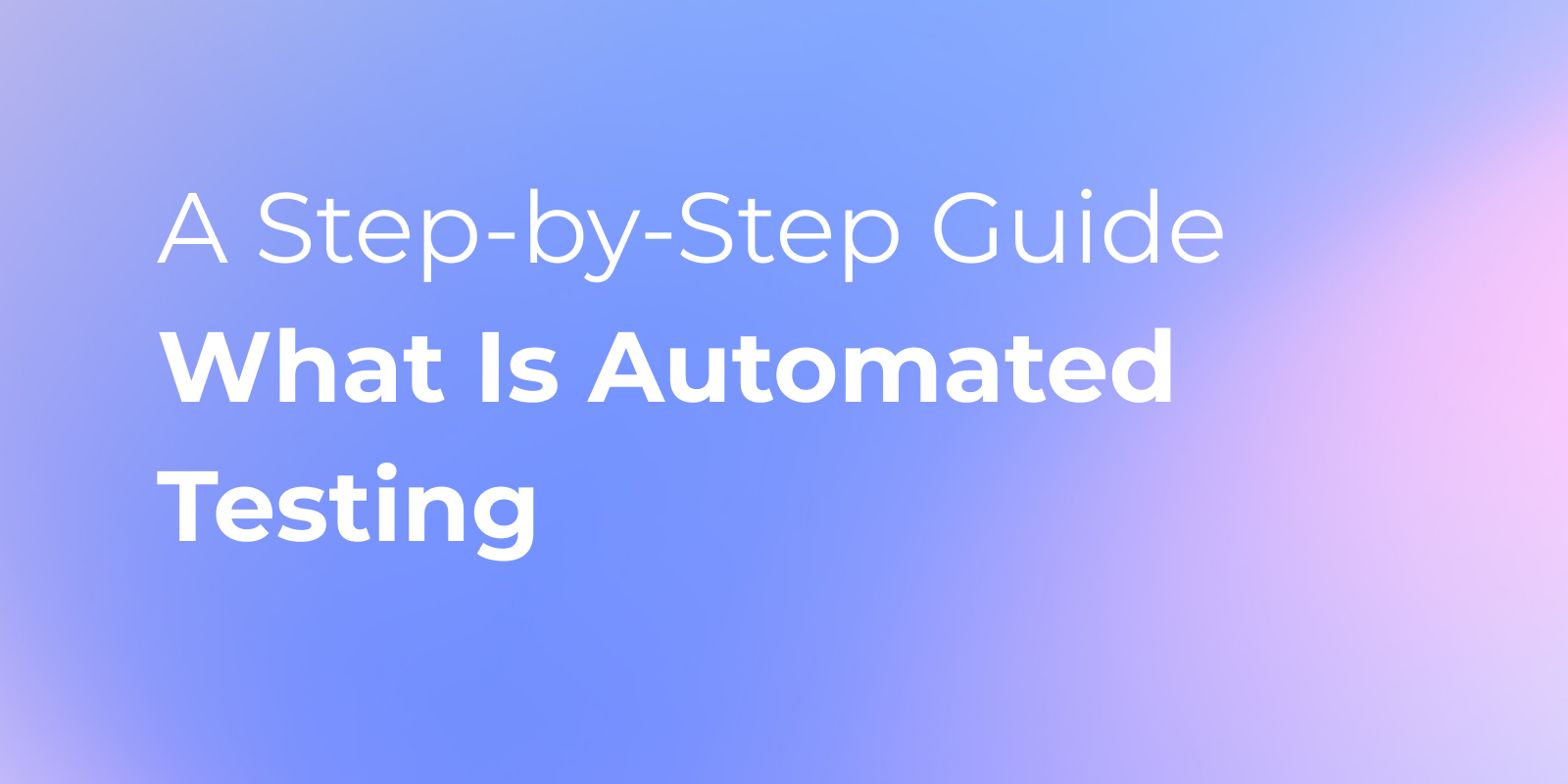Automated testing is one of the most critical parts of developing business scenarios for many testers. Compared to manual testing, API automated testing tools enable developers and QA teams to write, execute, and maintain API tests, streamlining the testing process and catching issues early in the development cycle.
So, if you want to pick up good API automated testing tools for your work, this post will help. In this article, we will walk through the popular automated testing tools on the market. Let's check it out now.
What is Automated Testing?
API testing is crucial for ensuring the reliability, security, and performance of web services and applications that rely on APIs. With the increasing complexity of modern software systems, automated testing tools have become essential for efficiently validating APIs.

The Best API Automated Testing Tools
Let's move on to the list of API automated testing tools. API automated testing tools are designed to help developers and testers validate the functionality, performance, and reliability of APIs by automating the testing process.
These tools can simulate real-world scenarios, create test cases, and generate detailed reports, making it easier to identify and fix issues before deployment. Here are some of the best API automated testing tools available:
APIDog: Overall Best API Automated Testing Tool
Apidog is a user-friendly, free API testing tool with powerful features. It allows developers and testers to send real-time HTTP requests to APIs and offers features like test data generation, request and response validation, and CI tool integration.
Key Features of APIDog:
- Real-time API testing
- User-friendly interface
- Parameter customization
- Request and response validation
- Compatibility with multiple data formats
Pricing: Free for basic use with no limit time and credit card.
Website: https://apidog.com
JMeter: Popular Open Source REST API Testing Automation Tool
JMeter is a popular open-source tool for load and performance testing that can also be used for REST API testing. It is suitable for testing large, complex systems or applications with various configurations.

Key Features:
- Load and performance testing
- Functional API testing
- Support for multiple protocols (HTTP, FTP, WebSockets)
- Highly extensible through plugins and scripting
- Detailed reporting and visualization
Pricing: Free open-source tool
Website: https://jmeter.apache.org
Katalon Studio: General Usage API Automated Testing Tool
Katalon Studio is a comprehensive test automation solution that supports web, mobile, and API testing. It offers a user-friendly interface and powerful features, making it a popular choice for automation engineers and QA teams.

Key Features:
- Cross-platform compatibility (Windows, macOS, Linux)
- Support for multiple programming languages (Java, Ruby, Python, Groovy)
- Integration with popular tools like Jira, qTest, and Jenkins
- Built-in reports and analytics
- Parallel execution for faster test runs
Pricing: Free for basic use, paid plans start at $629/year
Website: https://katalon.com
SoapUI: Old School REST API Automated Testing Tool
SoapUI is a veteran in API testing, with robust capabilities for SOAP and REST APIs. It is well-suited for teams needing enterprise-level capabilities, especially for testing and migrating legacy SOAP APIs.

Key Features:
- Versatile API support (REST and SOAP)
- User-friendly interface
- Protocol and data format flexibility
- Integration with development tools like Eclipse and IntelliJ IDEA
- Paid versions enable schema validation, mock services, load testing, and security scans
Pricing: Free open-source version, paid plans start at $659/year
Website: https://www.soapui.org
Postman: A Popular API Automated Testing Tool
Postman is a popular choice for API automated testing due to its user-friendly interface and extensive feature set. It allows you to automate your tests, making it an excellent choice for regression testing.

Key Features:
- Automation for test suites and regression testing
- Extensive libraries and collections
- Real-time collaboration for teams
- Integration with popular tools and services
- Monitoring and analytics features
Pricing: Free for basic use, paid plans start at $12/month
Website: https://www.postman.com

Selenium: API Automated Testing Tool, For Web Application Testings
Selenium is a widely-used open-source tool for automating web browser interactions. While primarily focused on web application testing, it can also be used for testing APIs that involve web interactions.

Key Features:
- Support for multiple programming languages (Java, Python, C#, Ruby)
- Cross-browser compatibility
- Parallel test execution
- Integration with popular tools and frameworks
- Extensive community support and resources
Pricing: Free open-source tool
Website: https://www.selenium.dev
REST Assured: API Automated Testing Tool, Build with Java

REST Assured is a Java library that simplifies automated testing of REST APIs. It reduces complexity around request and response assertions and complex object mapping by providing a domain-specific language.
Key Features:
- Simplified API testing with a fluent API syntax
- JSON and XML support
- Integration with test frameworks like JUnit and TestNG
- Lightweight and easy to learn
- Extensive documentation and community support
Pricing: Free open-source library
Website: https://rest-assured.io
Insomnia: Simple API Automated Testing Tool
Insomnia offers a simple way to send requests and view responses as a popular Postman alternative. It is completely free and supports features like cookies, OAuth2 authentication, environments, and test scripting.

Key Features:
- Code snippets in multiple languages
- Support for environment variables
- Collaboration features
- Automation with scripts
- Clean and elegant interface
Pricing: Free open-source tool
Website: https://insomnia.rest
Apigee: API Automated Testing Tool for API Security
Apigee is an API management platform equipped with various tools and capabilities that aid organizations in the design, development, security, and administration of APIs.

Key Features:
- Scalability for high API traffic loads
- Multi-cloud support
- Developer-friendly tools and resources
- API lifecycle management
- Analytics and monitoring
Pricing: Enterprise pricing, contact for a quote
Website: https://cloud.google.com/apigee
Runscope: API Automated Testing Tool for QA
Runscope is a comprehensive API monitoring and testing platform that offers a range of features for developers and QA teams. It enables users to create, execute, and schedule API tests, as well as monitor API performance and health.

Key Features:
- API test automation
- API monitoring and alerts
- Test environments and data buckets
- Collaborative team features
- Detailed test metrics and reports
Pricing:
Runscope offers a free plan with limited features, as well as paid plans starting at $99/month for teams.
Website: https://www.runscope.com/
Here are two additional sections about Swagger and Playwright:
Swagger: Streamlining API Development and Documentation

Swagger is a powerful set of tools for API development that has become an industry standard for designing, building, documenting, and consuming RESTful APIs. Here's an overview of its key components and benefits:
Key Components of Swagger:
Swagger Editor: A browser-based editor where you can write OpenAPI specifications in YAML or JSON format.
Swagger UI: A web-based interface that dynamically generates interactive API documentation from an OpenAPI specification.
Swagger Codegen: Generates server stubs and client SDKs for APIs in various programming languages.
SwaggerHub: A cloud-based platform for API design and documentation, offering team collaboration features.
Benefits of Using Swagger:
- Standardization: Promotes a standardized way of describing RESTful APIs using the OpenAPI Specification.
- Interactive Documentation: Provides clear, interactive documentation that developers can use to understand and test APIs.
- Code Generation: Automates the creation of server and client code, reducing development time.
- API-First Design: Encourages designing APIs before implementation, leading to more thoughtful and consistent APIs.
- Ecosystem Integration: Integrates with various API tools and platforms, enhancing the overall API development workflow.
Swagger has become an essential tool for many organizations, helping to improve API quality, speed up development, and enhance collaboration between frontend and backend teams.
Playwright: Modern Web Testing and Automation

Playwright is a relatively new but rapidly growing tool for web testing and automation. Developed by Microsoft, it offers cross-browser automation for Chromium, Firefox, and WebKit with a single API.
Key Features of Playwright
Cross-Browser Support: Automate tests across Chromium (Chrome, Edge), Firefox, and WebKit (Safari) browsers.
Auto-Wait: Automatically waits for elements to be ready before performing actions, reducing the need for explicit waits.
Network Interception: Allows mocking and modifying network requests during tests.
Mobile Emulation: Supports testing of mobile web applications through device emulation.
API Testing: Provides capabilities for API testing alongside UI testing.
Advantages of Playwright:
- Speed and Reliability: Offers faster and more reliable tests compared to many traditional automation tools.
- Modern Web Support: Designed to work well with modern single-page applications and progressive web apps.
- Powerful Selectors: Includes CSS, XPath, and text-based selectors, as well as custom attribute selectors.
- Codegen: Features a codegen tool that records user actions and generates test scripts.
- Language Support: Supports multiple programming languages including JavaScript, TypeScript, Python, .NET, and Java.
Playwright is gaining popularity among developers and QA professionals for its ability to create robust, efficient, and easy-to-maintain automated tests across multiple browsers and platforms.
Bruno: Simple, Open Source API Automated Testing Tool

Bruno is an API testing tool that aims to simplify the process of writing and maintaining API tests. It provides a user-friendly interface and supports various programming languages, making it accessible to both developers and non-technical team members.
Key Features:
- API test creation and execution
- API documentation and collaboration
- Test data management
- Integration with CI/CD pipelines
- Reporting and analytics
Pricing:
Bruno offers a free plan with limited features, as well as paid plans starting at $99/month.
Website: https://brunopro.com/
RapidAPI (Paw): Full-featured API Automated Testing Tool
Paw, now call RapidAPI, is a full-featured API testing and development tool designed primarily for macOS. It offers a wide range of features to help developers design, test, and document APIs.

Key Features:
- API testing and automation
- API design and documentation
- Code generation for various languages
- Environment management
- Team collaboration and sharing
Pricing:
RapidAPI for Mac is free for personal and professional use, but with limited team members. It has a one-time purchase pricing model, with a basic version available for $49.99 and a pro version for $199.99.
Website: https://paw.cloud/
Karate: Another Open Source API Automated Testing Framework

Karate is an open-source API test automation framework built on top of Cucumber. It combines API testing and mocking into a unified DSL and integrates with popular CI/CD platforms like Jenkins.
Key Features:
- API testing and automation
- Mocking services
- Built-in support for HTTP requests and assertions
- Integration with Cucumber for behavior-driven development (BDD)
- Integration with popular CI/CD tools
Pricing: Free open-source tool
Website: https://github.com/intuit/karate
Conclusion: Which API Automated Testing Tool to Choose From?
These are the guide of API automated testing tools, each with its own strengths and features. When choosing a tool, it's essential to consider factors such as your team's specific needs, the programming languages and frameworks you use, and your budget.
Additionally, it's recommended to evaluate the tools' documentation, community support, and integration capabilities with your existing development and testing workflows.
FAQs About Automated API Testing
Which tool is used to automate API testing?
Several tools are commonly used for automating API testing:
- Postman: A popular choice for its user-friendly interface and powerful scripting capabilities.
- REST-assured: A Java-based library that's excellent for developers working in Java environments.
- SoapUI: Offers comprehensive testing for both SOAP and REST APIs.
- JMeter: While primarily known for load testing, it also supports functional API testing.
- Karate: An open-source tool that combines API testing with performance testing and UI automation.
The choice of tool often depends on factors such as the team's expertise, the specific APIs being tested, and integration requirements with existing development workflows.
How do I automate API load testing?
To automate API load testing, follow these steps:
- Choose a suitable tool: Popular options include Apache JMeter, Gatling, or LoadRunner.
- Define test scenarios: Identify the API endpoints to be tested and the expected load patterns.
- Create test scripts: Use the chosen tool to create scripts that simulate the desired user behavior and API calls.
- Configure test parameters: Set up variables such as number of concurrent users, ramp-up time, and test duration.
- Execute the test: Run the load test, simulating the defined user load.
- Monitor and analyze results: Collect data on response times, throughput, and error rates.
- Integrate with CI/CD: Automate the execution of load tests as part of your continuous integration pipeline.
Which tool is best for API performance testing?
Several tools excel in API performance testing:
- Apache JMeter: Open-source and widely used for load and performance testing of APIs.
- Gatling: Known for its high performance and ability to simulate high concurrency.
- LoadRunner: A comprehensive performance testing tool suitable for enterprise-level testing.
- K6: A modern, developer-centric tool for load and performance testing.
- Locust: An open-source tool that allows writing performance tests in Python.
The "best" tool depends on your specific requirements, such as the scale of testing, budget, and team expertise. JMeter is often a good starting point due to its versatility and large community support.
Can we use Selenium for API testing?
While Selenium is primarily designed for web browser automation, it is not typically used for API testing. However, there are some scenarios where Selenium can be indirectly involved in API testing:
- UI-driven API testing: Selenium can be used to interact with a web interface that triggers API calls, allowing indirect testing of APIs.
- Combining with API testing tools: Selenium can be used alongside dedicated API testing tools in a comprehensive test suite.
- Limited API interactions: Selenium's underlying WebDriver can make HTTP requests, which could be used for basic API interactions, though this is not its intended use.
For direct and efficient API testing, it's generally recommended to use tools specifically designed for API testing, such as Postman, REST-assured, or SoapUI. These tools offer more appropriate features for API testing, including easier request construction, response validation, and performance analysis capabilities.




